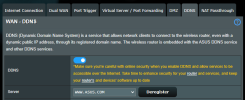Hello all,
Untill now I have opened a port to view my cameras remotely, finally I had yesterday the courage to look into VPN and set it up . not rocket science , but so many options . But it works.
I have setup OpenVPN on the blue iris computer at home (windows 11) , with credentials from VPNbook (using the .........-tcp80.ovpn) and the free VPN account.
I do have a couple of questions, I hope someone can answer them., I am unable to find the answers myself.
1) I assume , this is much safer as opening a port ( the port is now closed and I have acces with Blue iris and also can use Microsoft remote acces), but also using the free VPNBook account? , is this still safe?
2) The IP adress which is assigned with OpenVPN , will that IP adress stay the same , or does it change? and when I reboot the server? ( this to setup the blue iris app for my family).
3) I noticed it is not very fast, quite a bit slower as when I connected with opening a port, will a paid service make a difference ? will that be "safer" as well? any suggestions here?
4) I have setup the server now on the blue iris server, all is working , but I see I can also use my router to run OpenVPN instead of the Blue iris server (with openwrt) , does that have a benefit?
many thanks for the help,
Cornelis
Untill now I have opened a port to view my cameras remotely, finally I had yesterday the courage to look into VPN and set it up . not rocket science , but so many options . But it works.
I have setup OpenVPN on the blue iris computer at home (windows 11) , with credentials from VPNbook (using the .........-tcp80.ovpn) and the free VPN account.
I do have a couple of questions, I hope someone can answer them., I am unable to find the answers myself.
1) I assume , this is much safer as opening a port ( the port is now closed and I have acces with Blue iris and also can use Microsoft remote acces), but also using the free VPNBook account? , is this still safe?
2) The IP adress which is assigned with OpenVPN , will that IP adress stay the same , or does it change? and when I reboot the server? ( this to setup the blue iris app for my family).
3) I noticed it is not very fast, quite a bit slower as when I connected with opening a port, will a paid service make a difference ? will that be "safer" as well? any suggestions here?
4) I have setup the server now on the blue iris server, all is working , but I see I can also use my router to run OpenVPN instead of the Blue iris server (with openwrt) , does that have a benefit?
many thanks for the help,
Cornelis



